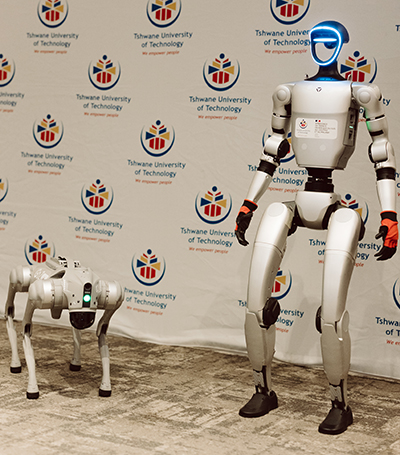VC Welcome Remarks at the AI Seminar hosted by the TUT AI Hub on 4 March 2025
It was a beautiful if also historical moment, when on the 24th of March 2023, in partnership with the Department of Communication and Digital Technologies and the University of Johannesburg, the TUT Hub of the AI Institute of South Africa was launched. That occasion was witnessed by more than a hundred people and a few robots and drones, with algorithms lurking in the background.
Two years later, we gather to celebrate the amazing strides made by the TUT AI Hub within TUT, within the higher education sector and in the county as a whole. The TUT AI Hub has modeled, showcased, exemplified and personified Artificial Intelligence (AI) in its transformative, disruptive and future-shaping power. Most importantly, the TUT AI Hub focus has been anything but frivolous. Instead, the TUT AI Hub, has zoomed in on various societal challenges such as mitigating the effect of climate change on food security, health care provision for, amongst others, people living with disability or severe injuries.
Everywhere we look, AI has become ubiquitous. It influences the way we work, the way we travel, the way we talk, the way we learn and teach, the way we transact, the way we consult, love and laugh. Consider the impact of powerful language models developed by the likes of Google, Meta, OpenAI, and the recent and disruptive launch of DeepSeek AI.
The transformative power of AI cannot be gainsaid. Neither can its potential for fanning economic growth. But many challenges remain.
One of the most well-known is the growing digital divide both within and between countries as well as between geopolitical regions. The second is the seemingly deleterious relationship between the 4IR and environmental sustainability.

TUT Vice-Chancellor and Principal, Prof Tinyiko Maluleke
AI must contribute to the creation of the earth that is home to humans, plants, animals and the entire natural environment. The third set of challenges relate to AI regulation, ethics, transparency, and governance. Nor has the ownership and dispersal of the most powerful AI tools and capabilities been democratic. Currently, the commanding heights of 4iR and AI industry are owned and monopolised by a handful of superrich individuals and oligarchs. Microsoft, Google, Apple and their equivalents in China have a predilection to locking their customers into their own suites of applications and products.
In his book AI Superpowers: China, Silicon Valley, and the New World Order, former Apple and Microsoft executive and celebrated AI practitioner, Kai-Fu Lee, is concerned about “the trend toward monopolization in the online world”. He is even more worried about, “AI’s natural affinity for monopolies [which] will bring winner-take-all economics to dozens more industries”. Kai-Fu Lee goes on to suggest that whereas “artificial intelligence promises to produce wealth on a scale never before seen in human history … if left to its own devices, [it] will also produce a global distribution of wealth that is not just more unequal but hopelessly so”.
Lee does not skirt around the question of the jobs bloodbath that is being caused by AI. He also foresees a growing and unprecedented human crisis of meaning as AI will prove to be more intelligent, more efficient and more productive than human beings. This crisis of meaning confronted Lee, as he lay on a hospital bed in the city of his birth, Taipei (Taiwan), diagnosed with stage IV lymphoma cancer in September 2013. Fortunately, he survived the scare.
Lee is no AI Luddite. Few people know the power and promise of AI better than him. Few have sacrificed quite as much for the advancement of AI in the world. On the 16th of December 1991, while Lee was anxiously awaiting his pregnant wife – Shen-Ling - to deliver their first baby – which would make him a father for the first time - it turns out that Lee himself, then the chief scientist for speech recognition at Apple, was thinking about another form of ‘delivery’. He was itching to dash across town to go and make a presentation and seek Apple CEO Jon Sculley’s endorsement of his proposal “to include speech synthesis in every Macintosh computer and speech recognition in all new types of Macs”. As soon as the baby was delivered, Lee dashed out of the hospital like a bullet. Off to the Apple headquarters he went to deliver his presentation. The later emergence of Siri - now ubiquitous - is one of the fruits of Lee’s ground work in speech recognition.
The main point of his 2021 book is to explore how “to use artificial intelligence to double down on what makes us truly human”. Now, that is the leitmotif of the Tshwane University of Technology’s approach to AI; the reason AI and 4iR skills are not optional but compulsory for TUT staff and students. We believe in the transformative power of AI and in its ability to “bestow upon South Africa [and the world] the greatest gift possible—a more human face”, as foregrounded by Steve Biko many years ago.
AI is not something that will happen in the future. It is already here. In all the crises that the world is facing – war, poverty, drought, inequality and especially unemployment – AI is not a neutral bystander. In all these, AI is implicated. The challenge facing AI scholars, researchers and innovators is to make AI part of the solutions and not part of the problems facing humanity in the 21st Century.

TUT Robots.
